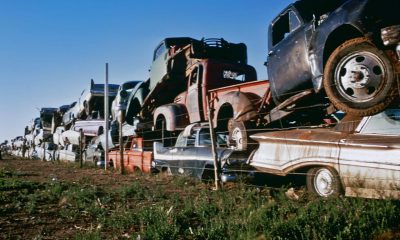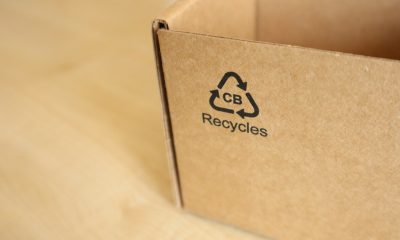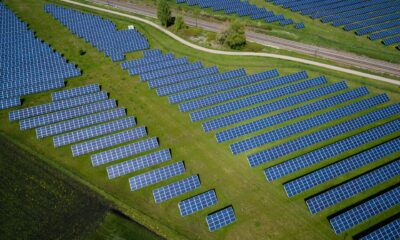Impact Investing
How C4CEC Is Transforming Coffee Waste into Sustainable Value
The coffee industry generates over 40 million tons of waste yearly, yet these by-products hold vast potential. The Center for Circular Economy in Coffee (C4CEC) promotes upcycling for energy, cosmetics, and food. Founded in 2023, C4CEC drives innovation through training, research, and pilot projects, helping global stakeholders turn waste into sustainable value and resilience.

Every year, the global coffee industry generates over 40 million tons of by-products, the equivalent of seven times the weight of the Great Pyramid of Giza: pulp, peels, parchment, exhausted grounds that too often end up wasted, despite their enormous potential. C4CEC comes to the rescue.
Yet, it is precisely in these wastes that the key to transforming the sector lies: ingredients for cosmetics and food, biomass for biochar and renewable energy, innovative and functional materials. Incorporating the principles of the circular economy into the coffee supply chain means much more than recycling: it means reducing costs by enhancing existing resources, improving competitiveness with sustainable products, strengthening resilience to climate change and opening new income channels for farmers and businesses, creating value from what we currently consider waste.
It is with this vision that the Center for Circular Economy in Coffee ( C4CEC ) was created, the first pre-competitive global platform dedicated to accelerating the circular transition in the world of coffee. The center was founded in Turin in 2023 by the Giuseppe and Pericle Lavazza Foundation, in collaboration with the Polytechnic University of Turin, the University of Gastronomic Sciences of Pollenzo (UNISG), the International Coffee Organization (ICO), the International Trade Centre (ITC) and the United Nations Industrial Development Organization (UNIDO).
Currently, C4CEC is an active network of 56 members in 25 countries, with 60% of members represented by SMEs, and 20% by NGOs and public institutions, and includes entities such as the Specialty Coffee Association (SCA), Fairtrade International, the African Fine Coffees Association (AFCA), Slow Food, together with circular companies such as EcoBean, Detla Coffees and Kaffee Bueno, united to bring innovation and regenerate the entire supply chain.
C4CEC: Unlocking the Hidden Potential of Coffee Waste Through Innovation, Circular Economy, and Global Collaboration
C4CEC is therefore based on diversity and collaboration to promote shared solutions . Its activities are structured around three fundamental axes: training and promotion of the circular economy, collection and sharing of good practices, development of pilot projects and research.
To educate and engage the sector, the Centre produces courses, guides and technical materials, including the document Making a Case for Circular Economy in the Coffee Sector, produced with ITC and ICO, a summary of a global survey that highlights obstacles and opportunities for small and medium-sized coffee businesses.
A series of four webinars has also been built on this content , designed to activate an international community ready for change. Circular solutions in the coffee sector are explored, addressing topics such as upcycling of by-products, sustainable innovation or responsible management of the supply chain, with the aim of educating, inspiring and mobilizing stakeholders from all over the world towards a concrete and systemic transformation.
C4CEC is actively dedicated to collecting and disseminating scientifically validated best practices that demonstrate the hidden potential of coffee by-products , an often overlooked resource in a sector where only 1-5% of the cherry’s weight actually reaches the cup. These practices, accessible to all via the platform’s website, represent key tools for rethinking the entire supply chain from a regenerative perspective.
At the same time, the Center supports its members in the development of ideas and pilot projects, offering technical support and fostering connections between network actors to activate collaborations, experiments and funding opportunities. Thanks to strategic partnerships with organizations such as the Italian Agency for Development Cooperation (AICS) and UNIDO, concrete initiatives are currently underway in Africa and Asia, aimed at putting the circular economy into practice directly in the territories of origin of coffee.
This is the context in which, for example, the assessment for possible pilot projects oriented towards the circularity of the sector in Kenya, carried out in collaboration with AICS, fits in. The research team proposed concrete solutions to make local production more resilient and sustainable, from agricultural diversification to wastewater management, to the promotion of local consumption and the creation of training centers for farmers, roasters and baristas.
Finally, among the key references to guide the sector’s transition, the International Coffee Organization ‘s Coffee Development Report 2022–2023 stands out : Beyond Coffee: Towards a Circular Economy in Coffee , an analysis carried out with the contribution of 62 experts from 36 countries and in synergy with C4CEC, Fondazione Lavazza, ITC, Politecnico di Torino and University College London. The report offers recommendations to integrate circularity into policy and practice, emphasizing regenerative agriculture, local value creation and collective action.
The message is clear: coffee by-products are not waste, but precious resources with which to build a more equitable, resilient and sustainable future for the entire supply chain. Participating in this transformation is now possible, by joining the C4CEC network to access knowledge, collaborations and opportunities that can make a difference.
__
(Featured image by Mike Kenneally via Unsplash)
DISCLAIMER: This article was written by a third party contributor and does not reflect the opinion of Born2Invest, its management, staff or its associates. Please review our disclaimer for more information.
This article may include forward-looking statements. These forward-looking statements generally are identified by the words “believe,” “project,” “estimate,” “become,” “plan,” “will,” and similar expressions. These forward-looking statements involve known and unknown risks as well as uncertainties, including those discussed in the following cautionary statements and elsewhere in this article and on this site. Although the Company may believe that its expectations are based on reasonable assumptions, the actual results that the Company may achieve may differ materially from any forward-looking statements, which reflect the opinions of the management of the Company only as of the date hereof. Additionally, please make sure to read these important disclosures.
First published in ESG NEWS. A third-party contributor translated and adapted the article from the original. In case of discrepancy, the original will prevail.
Although we made reasonable efforts to provide accurate translations, some parts may be incorrect. Born2Invest assumes no responsibility for errors, omissions or ambiguities in the translations provided on this website. Any person or entity relying on translated content does so at their own risk. Born2Invest is not responsible for losses caused by such reliance on the accuracy or reliability of translated information. If you wish to report an error or inaccuracy in the translation, we encourage you to contact us

-

 Markets2 weeks ago
Markets2 weeks agoSilver Dips Sharply, While Gold Gains Amid Mixed Stock Market
-

 Africa3 days ago
Africa3 days agoMorocco’s Tax Reforms Show Tangible Results
-

 Africa1 week ago
Africa1 week agoTunisia Holds Interest Rate as Inflation Eases, Debate Grows
-

 Fintech6 days ago
Fintech6 days agoRuvo Raises $4.6M to Power Crypto-Pix Remittances Between Brazil and the U.S.

























